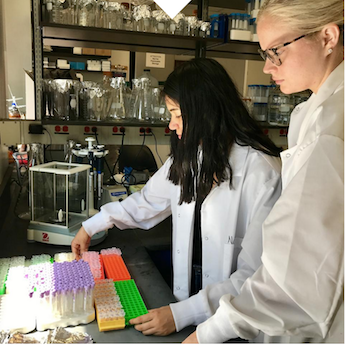Research Opportunities
Barnard students have a variety of opportunities to conduct neuroscience research. While a few opportunities are restricted to NSB majors, many others are open to all students who want to explore neuroscience.

- Independent Study. For-credit, supervised research available in labs in our department or outside. For more information visit here.
- Senior Thesis. A year-long program offered to NSB majors, which involves the completion of an independent research project and the participation in the senior seminar. For more information, visit here.
- Summer Research Institute (SRI). This program sponsors summer research projects that students conduct under the guidance of a faculty mentor. Through this program students receive summer funding and subsidized campus housing. For more information about SRI, visit Barnard's website.
- Internship opportunities. Fellowships for conducting neuroscience research during the summer are offered in a number of institutions across the country, as reported on this site.
- Joining a lab. Participating in lab meetings or helping with a research project represents valid experiences for learning about a lab and understanding if a lab fits your interests well. Off campus jobs may be unpaid. Barnard (not Columbia) jobs are all paid according to internal Barnard regulations.
Research in Barnard NSB labs
While looking for research opportunities in neuroscience, you may find it useful to know about the research of the faculty members of Barnard NSB. Their research interests are described here.
Outside of Barnard NSB
You can take part in the research opportunities available to Barnard students in one of the many labs affiliated to the Departments of Psychology and Biology at Barnard, the Departments of Psychology and Biological Sciences at Columbia University, the Zuckerman Institute, CU Medical Campus, NY State Psychiatric Institute, and nearby universities, including NYU, Rockefeller University and Icahn School of Medicine at Mount Sinai. Labs joined by present and past Barnard students are listed on the page Lab Opportunities.
Lab Opportunities

How do I find a lab for my senior thesis or an independent study, or if I would like to volunteer in a research project?
The NSB department periodically announces labs seeking new students. Announcements are circulated trough the email list of neuroscience students created by the department (if you want to be included in the list, please email mmiozzo@barnard.edu). The department coordinates the student-lab matching.
Students can also conduct their own search and contact a lab directly. It is recommended to plan the search with the student advisor. You can also contact Dr. Michele Miozzo, the department representative for lab placements. Useful information for selecting and contacting a lab can be found in the FAQ section below.
Here you can find a list of labs joined by past and present NSB students. This is a useful resource for students who want to join a lab or want to get a sense of existing opportunities. You can also explore the research interests of Neuroscience faculty within Barnard NSB Department, the Departments of Psychology and Biology at Barnard, the Departments of Psychology and Biological Sciences at Columbia University, the Zuckerman Istitute, CU Medical Campus, NY State Psychiatric Institute, and nearby universities, including NYU, Rockefeller University and Icahn School of Medicine at Mount Sinai. Columbia University has a website listing research opportunities for undergraduates (Barnard students have access to it). You can explore the neuroscience labs listed there.
Tips for Finding A lab
Finding a lab may require some effort. Labs may not have openings; while busy in wrapping up projects, research teams may not have the resources to train a new student; and overflowed with requests, PIs may be slow to respond. In these circumstances, you might need to persevere -- and do some planning.
• Homework. There are many neuroscience labs at Barnard, Columbia, Columbia Medical School, and the Zuckerman Institute -- and in NY at large. Explore the research interests of Neuroscience faculty within Barnard NSB Department, the Departments of Psychology and Biology at Barnard, the Departments of Psychology and Biological Sciences at Columbia University, the Zuckerman Istitute, CU Medical Campus, NY State Psychiatric Institute, and nearby universities, including NYU, Rockefeller University and Icahn School of Medicine at Mount Sinai. Read the lab profiles available online to find labs investigating themes that align with your interests.
• Take a chance. You join a lab to get experience in research and science. Any lab could do it! You may not find a lab matching perfectly to your interests. But all labs offer the exposure to research and science you look for.
• Seek help. Your advisor and NSB faculty can offer valuable suggestions. Ask their advice. Furthermore, on the NSB site you find a list of labs with openings or where NSB students worked in the past. This is a useful resource.
• Ask to a friend. Do you have a friend at Barnard who is already working in a lab? Ask her about her lab and how she likes to work there. If you find her lab an interesting choice, you can ask your friend to introduce you to her lab supervisor. If the lab supervisor trusts your friend, the lab supervisor will probably trust your friend's recommendation as well.
• Be strategic. There are a few things you may want to write in your email to the lab PI to make it more effective. Tell why you are interested in that particular lab. Describe what you know -- especially knowledge and skills you acquired in lab courses that could turn very useful in wet labs. Mention if your advisor or any NSB faculty recommended that lab. In essence, include anything that would make your request less anonymous and generic and more personal and specific. (Detailed information about contacting a lab is provided on this page under the question "How do I contact a lab?")
Tips for Contacting a Lab
Here are a few useful suggestions about how to email professors about research opportunities in their labs.
Be concise Faculty usually receive a large volume of emails, and you are more likely to get a response if it is easy to identify the salient points in your message. Avoid sending a long, generic message explaining all your different areas of interest and reasons for wanting to get involved in research. Select the most important points only, and mention them briefly.
Be informative The following information should ideally be part of your email:
- A subject line that clearly states the aim of your message
- A very brief introduction of yourself. Keep in mind that your signature may already have some important information (affiliation, major, graduation year, etc.)
- The reason of your email (TIP: It is always a good idea to visit the lab’s website and read about their research before sending your email.)
- Include your CV or resume and, if relevant, your college transcripts.
If you are writing about a research opportunity:
- Mention how you know the lab or came across their research (in a class, through the department website, through a friend who works there, etc.).
- Explain that you are interested in that lab in particular. Always avoid generic messages. What is it about their research that you find interesting, and why? (TIP: Even if you find some aspects technically challenging, reading a recent article from the lab will give you a clearer idea of the type of work they do.)
- Describe any relevant experience that you may have. (TIP: keep it simple and specific, for example "last Summer I learned to extract insect DNA during a research stay at the Natural History Museum under the supervision of Dr. xxx.")
- If you have very good grades, you could mention it, but don´t worry too much if you don´t. Research skills and good grades may or may not coexist, and many excellent scientists did not have particularly strong records. Doing laboratory research and excelling at studying require very different skills
- Mention if you are interested in working in the lab as a research assistant (a paid position) or for academic credit (independent research studies: https://neuroscience.barnard.edu/independent-study-0), or either.
If you are responding to an opening:
- Mention how you learned about the opening
- Describe your qualifications for the position referring to specific points in the opening description (for example: Chemistry major, Programming in R, DNA extraction, etc.)
- List the names, affiliations and contact information of 2-3 people who could serve as references.
Be polite and use standard language
- Address the recipient as Dr. or Prof., at least on your first interaction
- Avoid slang, abbreviations, and emoticons (for example, avoid saying things like "idk if you are accepting students")
- Use standard punctuation and grammar
- Avoid sending emails during weekends and holidays
- Be respectful and don’t assume that the recipient can meet with you immediately (TIP: instead of saying something like "I would like to meet with you to discuss my interest in this position as soon as possible," say "If possible, I would like to schedule a meeting to discuss this in person," or, if it is an option, simply mention that you will be attending office hours).
For more information you can consult these sources:
What Helps?
Neuroscience labs are increasingly looking for students with programming skills. If you plan to join a lab, you should consider taking courses on computer science and programming -- you will acquire skills spendable not only in labs but in innumerable other contexts.